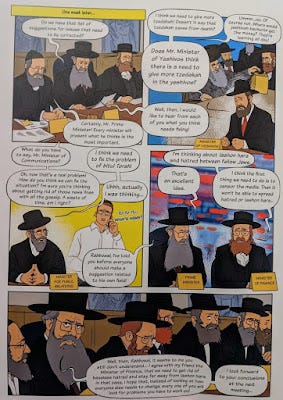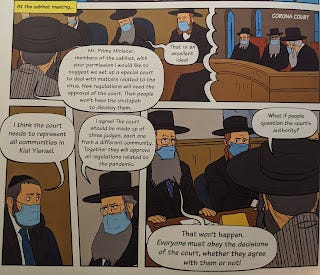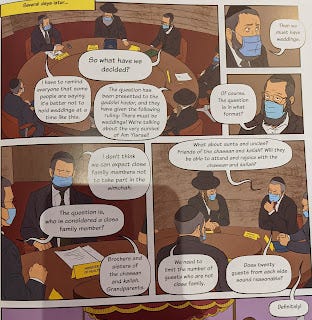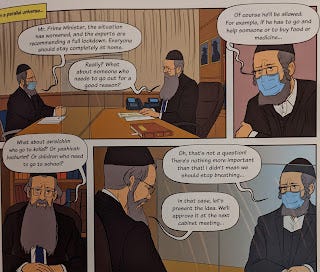Stranger Things

I'd like to continue my review of Just Imagine!, a graphic novel about a fictitious universe "in which Eretz Yisrael was run solely according to Torah" and is facing the Covid pandemic.
In this ideal Eretz Yisrael, there are no secular Jews. That's because it's set in a fictitious world in which everyone accepts the divinity of Torah. But not only are there no secular Jews - there are also no dati-leumi Jews. And there don't appear to be any Sefardi Jews either. There's Ashkenazi Litvishe charedim and chassidim. Those are the only Torah Jews which exist in this ideal universe.
Actually, there is one exception. There's a professor who is a conspiracy theorist against vaccines. It's great that the book portrays this person as an unpleasant crank. But why is this lunatic the only person in the book who not only lacks a beard, but also wears a blue shirt and has a small blue kippah?!
(In case you're wondering - there ARE female characters in this universe. Not many - just one, who appears on one page. Still, that's infinitely more than you might accept, and perhaps we should be grateful for small mercies.)
But after finishing the book, I suddenly realized that there are two other type of people who are strangely absent from the entire book. Bear in mind that the bulk of the book is about governments meetings of charedi ministers and their discussions about the risks of coronavirus and what to do about it. And do you know who never appears? A medical expert!
That's right. The cabinet ministers are constantly discussing the dangers and arguing about what behavior is dangerous, and yet never once do they need an expert medical opinion! There are no physicians, no epidemiologists, no immunologists.
What is the reason for this? I wonder if this is because such a character is impossible to exist. In a world where everyone is charedi, there simply can't be any physicians. Because nobody goes to college!
Alternatively, and perhaps more likely, I think that it's because in the author's mindset, there is simply no need for such a role. Who needs experts? Everyone's an expert!
But it's the other conspicuously absent type of character that is even stranger.
There are no Gedolim.
When the cabinet first meets to figure out the sin that brought the virus, nobody thinks of asking the Gedolim. When they try to decide which is the primary spiritual hishtadlus that the medical hishtadlus needs to accompany, they don't ask the Gedolim. And when they decide to what extent the health precautions will infringe upon religious life, they don't ask the Gedolim. They just argue it out among themselves.

They do set up a "corona court" to decide various specific regulations. The Prime Minister agrees that "the court needs to represent all communities in Klal Yisrael," and thus selects "three judges, each one from a different community" (though all charedi, of course). He adds that questioning the authority of the court won't happen, because "Everyone must obey the decisions of the court, whether they agree with them or not!"
But this "corona court" is not The Gedolim. Because later in the book, when there's a question that vexes the cabinet - whether to delay weddings until after the pandemic - they don't ask the corona court. Instead, they decide that this is a question to be sent to Gedolei Yisrael.

Several days later, they receive the answer: That there should indeed be weddings. The Gedolim, however, have not seen fit to give any guidance whatsoever on what the format of the weddings should be, and so the members of the cabinet - not the Gedolim, not the corona court, and without any input from medical experts - argue it out and make their own decisions as to the rules. And then they get a letter from the Gedolim to say that everybody has to obey these rules, without exception - even though the Gedolim had no say in what these rules are!
It's just so strange. The book takes as its premise that the Gedolim are the source of ultimate wisdom, and yet the charedi prime minister and cabinet ministers argue out the most major decisions themselves without bothering to ask the Gedolim.

And the decisions are extraordinary. When the spread of the virus requires closures and severe limits on the number of people gathering indoors, they decide that "the exceptions will be shuls, chadarim, schools, yeshivos and kollelim." In those places, they only require plastic dividers and so on. And when later in the book, the pandemic grows even more severe, the cabinet decides that they must "close every place that is not essential for daily life" - which they clarify "obviously" does not include shuls, schools and yeshivos. And later, when it gets even worse and a full lockdown is required, because infection has gotten so bad that nobody can leave their home, the prime minister still clarifies that obviously this does not include closing yeshivos and kollels.
Why do the Gedolim play no part in the decision-making and guidance on these crucial issues? I can't even come up with a theory to explain the author's mindset. I'd welcome suggestions.
If you'd like to subscribe to this blog via email, use the form on the right of the page, or send me an email and I will add you.


